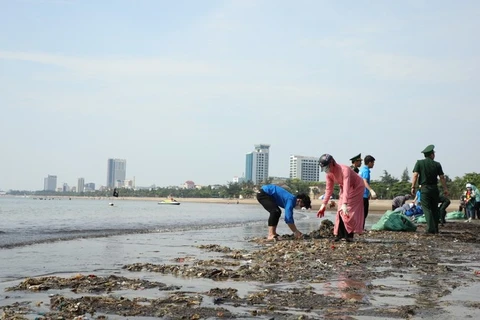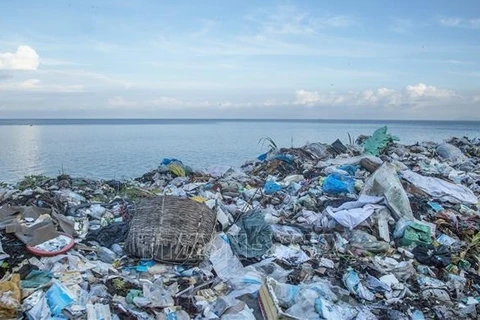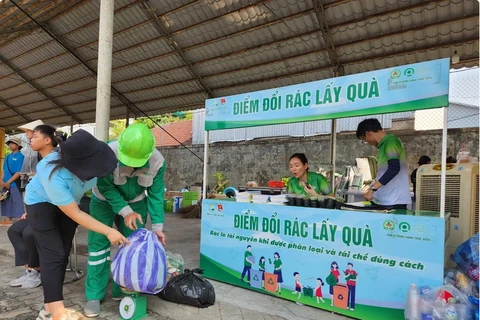Ottawa (VNA) – A delegation of Vietnamese negotiators joined those from 176 countries worldwide at the fourth session of the Intergovernmental Negotiating Committee (INC-4) on plastic waste in Ottawa, Canada, on April 23.
This session is to work towards finalising an agreement on a global treaty to eliminate plastic pollution by the end of this year. To achieve this goal, negotiators will need to reach a comprehensive legally binding compromise on plastic waste.
In his opening speech, Canadian Minister of Environment and Climate Change Steven Guilbeault said plastic has become a microcosm of consumer culture since the mid-20th century, adding that the world has depended on this culture. He underlined the necessity to forge a new consensus to eliminate this, putting an end to the waste, expense, and harm of plastic.
On the threshold of the meeting, Guilbeault said the meeting's goal is to achieve consensus on 60-70% of the treaty's content.
Vietnamese head delegate, Director of the International Cooperation Department under the Ministry of Natural Resources and Environment (MoNRE) Le Ngoc Tuan said Vietnam supports the current approach to tackling plastic pollution, but noted that to prepare for negotiations in this session and the next one, specific assessments of future impacts when participating in the agreement are necessary.
As a developing country, Vietnam seeks a balance where, alongside control measures, consideration should be given to implementation methods, including financial, technological, and capacity aspects, he said.
Talking to Vietnam News Agency in Canada, Tuan said Vietnam and other member countries all support building a legally binding global agreement to address plastic pollution.
He noted that this will serve as a legal framework for member countries to develop actions to reduce plastic pollution and collectively address environmental challenges.
Anthony Merante, a plastic waste campaigner from Oceana Canada, asserted that the world cannot delay resolving this crisis any longer.
Plastic pollution knows no borders and is the second most urgent environmental issue after climate change, he said, noting that the devastation caused by plastic pollution in the ocean is undeniable.
Methods and implementation roadmaps are also crucial because each country has its level of development and unique circumstances, making it impossible to apply a one-size-fits-all formula, he stressed
Statistics show that annual plastic production has more than doubled over the past 20 years to 460 million tonnes, and is on track to triple. Only 9% of the total is recycled.
This session is to work towards finalising an agreement on a global treaty to eliminate plastic pollution by the end of this year. To achieve this goal, negotiators will need to reach a comprehensive legally binding compromise on plastic waste.
In his opening speech, Canadian Minister of Environment and Climate Change Steven Guilbeault said plastic has become a microcosm of consumer culture since the mid-20th century, adding that the world has depended on this culture. He underlined the necessity to forge a new consensus to eliminate this, putting an end to the waste, expense, and harm of plastic.
On the threshold of the meeting, Guilbeault said the meeting's goal is to achieve consensus on 60-70% of the treaty's content.
Vietnamese head delegate, Director of the International Cooperation Department under the Ministry of Natural Resources and Environment (MoNRE) Le Ngoc Tuan said Vietnam supports the current approach to tackling plastic pollution, but noted that to prepare for negotiations in this session and the next one, specific assessments of future impacts when participating in the agreement are necessary.
As a developing country, Vietnam seeks a balance where, alongside control measures, consideration should be given to implementation methods, including financial, technological, and capacity aspects, he said.
Talking to Vietnam News Agency in Canada, Tuan said Vietnam and other member countries all support building a legally binding global agreement to address plastic pollution.
He noted that this will serve as a legal framework for member countries to develop actions to reduce plastic pollution and collectively address environmental challenges.
Anthony Merante, a plastic waste campaigner from Oceana Canada, asserted that the world cannot delay resolving this crisis any longer.
Plastic pollution knows no borders and is the second most urgent environmental issue after climate change, he said, noting that the devastation caused by plastic pollution in the ocean is undeniable.
Methods and implementation roadmaps are also crucial because each country has its level of development and unique circumstances, making it impossible to apply a one-size-fits-all formula, he stressed
Statistics show that annual plastic production has more than doubled over the past 20 years to 460 million tonnes, and is on track to triple. Only 9% of the total is recycled.
According to the Organisation for Economic Co-operation and Development (OECD), the "contribution" of plastic to global warming is likely to more than double by 2060.
Inger Andersen, Executive Director of the United Nations Environment Programme, emphasised the urgency for a treaty and specific actions to combat plastic pollution, affirming that time is running out for both finalising a treaty and for the earth's resilience./.
Inger Andersen, Executive Director of the United Nations Environment Programme, emphasised the urgency for a treaty and specific actions to combat plastic pollution, affirming that time is running out for both finalising a treaty and for the earth's resilience./.
VNA
























